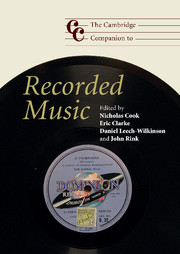Book contents
- Frontmatter
- Introduction
- Learning to live with recording
- A short take in praise of long takes
- 1 Performing for (and against) the microphone
- Producing a credible vocal
- ‘It could have happened’: The evolution of music construction
- 2 Recording practices and the role of the producer
- Still small voices
- Broadening horizons: ‘Performance’ in the studio
- 3 Getting sounds: The art of sound engineering
- Limitations and creativity in recording and performance
- Records and recordings in post-punk England, 1978–80
- 4 The politics of the recording studio: A case study from South Africa
- From Lanza to Lassus
- 5 From wind-up to iPod: Techno-cultures of listening
- A matter of circumstance: On experiencing recordings
- 6 Selling sounds: Recordings and the record business
- Revisiting concert life in the mid-century: The survival of acetate discs
- 7 The development of recording technologies
- Raiders of the lost archive
- The original cast recording of West Side Story
- 8 The recorded document: Interpretation and discography
- One man's approach to remastering
- Technology, the studio, music
- Reminder: A recording is not a performance
- 9 Methods for analysing recordings
- 10 Recordings and histories of performance style
- Recreating history: A clarinettist's retrospective
- 11 Going critical: Writing about recordings
- Something in the air
- Afterword: Recording: From reproduction to representation to remediation
- Notes
- Bibliography
- Discography
- Index
Broadening horizons: ‘Performance’ in the studio
Published online by Cambridge University Press: 28 September 2011
- Frontmatter
- Introduction
- Learning to live with recording
- A short take in praise of long takes
- 1 Performing for (and against) the microphone
- Producing a credible vocal
- ‘It could have happened’: The evolution of music construction
- 2 Recording practices and the role of the producer
- Still small voices
- Broadening horizons: ‘Performance’ in the studio
- 3 Getting sounds: The art of sound engineering
- Limitations and creativity in recording and performance
- Records and recordings in post-punk England, 1978–80
- 4 The politics of the recording studio: A case study from South Africa
- From Lanza to Lassus
- 5 From wind-up to iPod: Techno-cultures of listening
- A matter of circumstance: On experiencing recordings
- 6 Selling sounds: Recordings and the record business
- Revisiting concert life in the mid-century: The survival of acetate discs
- 7 The development of recording technologies
- Raiders of the lost archive
- The original cast recording of West Side Story
- 8 The recorded document: Interpretation and discography
- One man's approach to remastering
- Technology, the studio, music
- Reminder: A recording is not a performance
- 9 Methods for analysing recordings
- 10 Recordings and histories of performance style
- Recreating history: A clarinettist's retrospective
- 11 Going critical: Writing about recordings
- Something in the air
- Afterword: Recording: From reproduction to representation to remediation
- Notes
- Bibliography
- Discography
- Index
Summary
The past thirty or so years that I've worked as a recording producer have certainly formed my view on the relationship between music, recording and interpretation. Perhaps most of all, I have come to see how important it is for producers – themselves a form of musical catalyst – actively to engage with repertoire rather than contenting themselves only with performance. The longer I work in recording, the more convinced I become that composers rather than performers provide our music. The crisis the ‘business’ is now experiencing is due to the lack of platforms available to composers who have something to say to an intelligent, receptive, paying public. In a world where audiences have the freedom to choose what they wish to hear, it cannot be enough to rely on tax-payers to provide whatever meagre exposure composers have as their only means of dissemination. All my observations on performance and interpretation must therefore be taken in the context of an environment offering a surfeit of different musical views on a relatively static number of works. Indeed, discussing whether the studio adds or detracts to someone's performance of a Beethoven sonata recorded hundreds of times already is akin to calculating the number of angels dancing on the head of a pin during the Grand Inquisition. Pop music has stolen the initiative, told us what people are prepared to buy and left intelligent music lovers with less choice than before. If we were dealing with the written word, we would be living in a world of comic books with literature inhabiting the margins and virtually nothing in between except ungratifying verses by some worthy, publicly financed poets.
- Type
- Chapter
- Information
- The Cambridge Companion to Recorded Music , pp. 59 - 62Publisher: Cambridge University PressPrint publication year: 2009
- 1
- Cited by



